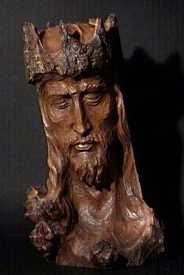
|
Victim and
Victor: Christ as the Archetype of Comedy |
Nelvin Vos argues that because Christ is the ultimate expression of
God's truth, that his life, death, and resurrection are the underlying pattern behind
human aspirations towards comedy. By suggesting this, he is assuming two things: 1)
that "the comic spirit" of life transcends our notions of humor to include the
shape of our narratives, i.e. a plot may be comic because it ends well or possesses a
certain irony, even if it isn't gut-busting funny on the surface of things; 2) that Christ
enacted in his earthly ministry the same pattern by which he shaped creation -- a pattern
that humans, even without the specific knowledge of Christ, nonetheless discern.
Thus, Vos contends that comic characters and plots tend to imitate either part or all of
Christ's own pattern. "Comedies of wit" tend to offer worlds without any
real pain or suffering, whose sense of purpose is self-assured. "Comedies of
the ludicrous", on the other hand, focus on worlds which are bitterly ironic because
they offer little sense of purpose; indeed, they mock the purposeless world. Vos
ultimately suggests that the most "Christ-like " comedies are those that bring
together victimhood (suffering, betrayal, etc.) with perception through testing.
"The Holy Fool" is one who enters into the world's pain and suffering in all its
irony but overturns it through a perception of truth and new purpose.
|
| Christ the Victor |
Messiah, Miracle Worker, Raises and Rose
from the Dead, Ascension, Return to Glory |
| Christ the Victim |
Suffering Servant, Lowly and Unrecognized, Betrayed and
Rejected, Sacrificial Lamb |
| Christ Victim and Victor |
Knows that his self-emptying results in
his exaltation |
| (Victor) "Comedy of
Wit" |
- Little or no suffering/ passion
- A perception of purpose in the world
- Triumphant and Victorious
|
| (Victim) "Comedy of the Ludicrous" |
- Little sense of purpose
- A perception of suffering and passion in the world
- Seems defeated or victimized
|
| (Together) "Comedy of the
Holy Fool" |
- Convinced of purpose in the world
- Tested by suffering and passion
- Reaches a new perception through mortification and triumph
|
Victor
A Comedy of Errors (Shakespeare); A
Midsummer Night's Dream (Shakespeare); The School for Scandal (Sheridan) |
Victim
Volpone (Ben Jonson);The Cherry
Orchard (Chekhov);some of Moliere;Waiting for Godot (Beckett) |
Together
Measure for Measure (Shakespeare); A
Cocktail Party (T.S. Eliot) |
|
